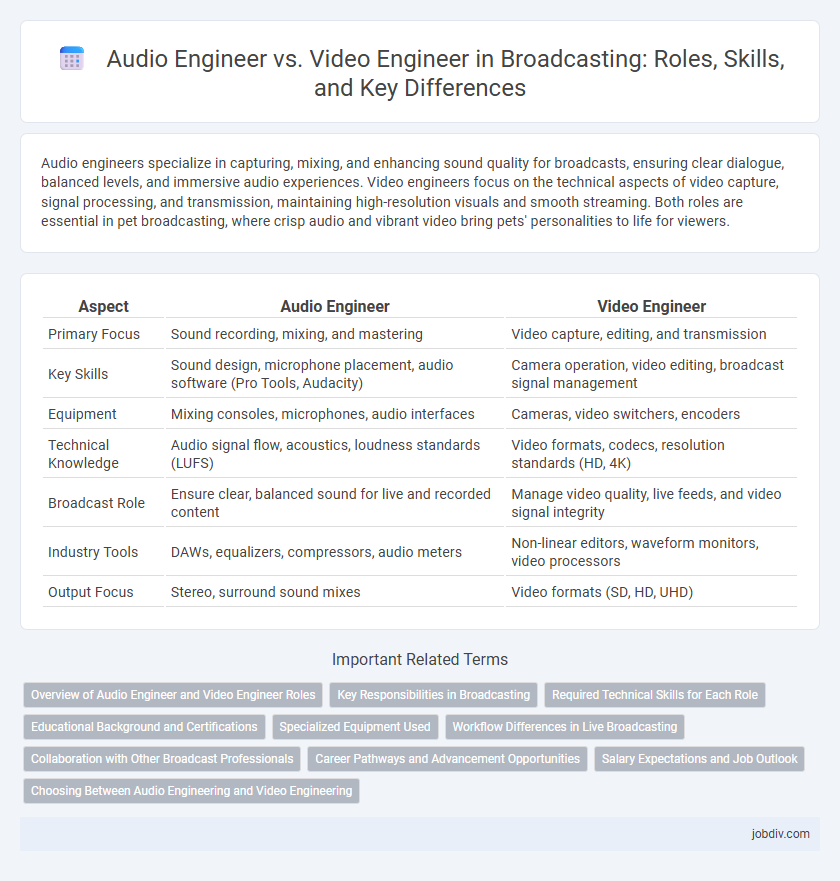Audio engineers specialize in capturing, mixing, and enhancing sound quality for broadcasts, ensuring clear dialogue, balanced levels, and immersive audio experiences. Video engineers focus on the technical aspects of video capture, signal processing, and transmission, maintaining high-resolution visuals and smooth streaming. Both roles are essential in pet broadcasting, where crisp audio and vibrant video bring pets' personalities to life for viewers.
Table of Comparison
| Aspect | Audio Engineer | Video Engineer |
|---|---|---|
| Primary Focus | Sound recording, mixing, and mastering | Video capture, editing, and transmission |
| Key Skills | Sound design, microphone placement, audio software (Pro Tools, Audacity) | Camera operation, video editing, broadcast signal management |
| Equipment | Mixing consoles, microphones, audio interfaces | Cameras, video switchers, encoders |
| Technical Knowledge | Audio signal flow, acoustics, loudness standards (LUFS) | Video formats, codecs, resolution standards (HD, 4K) |
| Broadcast Role | Ensure clear, balanced sound for live and recorded content | Manage video quality, live feeds, and video signal integrity |
| Industry Tools | DAWs, equalizers, compressors, audio meters | Non-linear editors, waveform monitors, video processors |
| Output Focus | Stereo, surround sound mixes | Video formats (SD, HD, UHD) |
Overview of Audio Engineer and Video Engineer Roles
Audio Engineers specialize in capturing, mixing, and enhancing sound quality for broadcasts, ensuring clear dialogue, immersive effects, and balanced audio levels. Video Engineers manage the technical aspects of video capture, signal processing, and transmission, maintaining image clarity and synchronization with audio. Both roles require expertise in specialized equipment and software to deliver seamless broadcast experiences.
Key Responsibilities in Broadcasting
Audio engineers in broadcasting are responsible for capturing, mixing, and enhancing sound quality for live and recorded programs, ensuring clear dialogue, balanced music, and appropriate sound effects. Video engineers handle the setup, operation, and maintenance of cameras, video switchers, and transmission equipment to deliver high-quality visual content. Both roles require collaboration to synchronize audio and video elements, maintaining seamless broadcast production.
Required Technical Skills for Each Role
Audio engineers require advanced knowledge of sound mixing consoles, signal flow, acoustics, and audio editing software like Pro Tools or Logic Pro, with expertise in microphone placement and sound reinforcement. Video engineers must be skilled in camera operation, video signal processing, color grading, live video switching, and familiarity with software such as Adobe Premiere Pro and DaVinci Resolve. Both roles demand proficiency in troubleshooting technical issues and ensuring optimal quality in live or recorded media production environments.
Educational Background and Certifications
Audio engineers typically hold degrees in audio production, sound engineering, or music technology, with certifications such as Avid Pro Tools or Certified Audio Engineer (CEA). Video engineers often pursue degrees in broadcast engineering, video production, or electronic media, supported by certifications like Society of Broadcast Engineers (SBE) Certified Video Engineer or Adobe Certified Expert (ACE). Both roles benefit from hands-on experience with industry-standard equipment and ongoing training to stay current with evolving broadcast technologies.
Specialized Equipment Used
Audio engineers utilize equipment such as mixing consoles, audio interfaces, microphones, and equalizers to capture and manipulate sound with precision. Video engineers rely on video switchers, cameras, monitors, and video waveform monitors to manage and enhance visual content during broadcasts. Both roles require specialized tools tailored to audio or visual signal processing to ensure high-quality production.
Workflow Differences in Live Broadcasting
Audio engineers in live broadcasting prioritize sound mixing, signal routing, and audio quality control using consoles and digital audio workstations, ensuring clear and balanced sound output. Video engineers focus on camera operations, video signal processing, and synchronization of visual feeds through switchers and routers to deliver seamless visual content. Workflow differences arise as audio engineers work primarily with acoustic elements and real-time sound adjustments, while video engineers manage visual framing, timing, and live video effects integration.
Collaboration with Other Broadcast Professionals
Audio engineers and video engineers collaborate closely with directors, producers, and technical staff to ensure seamless synchronization of sound and visuals in broadcast productions. Their teamwork is crucial for balancing audio levels, optimizing video quality, and maintaining real-time communication during live broadcasts. Effective collaboration enhances the overall viewer experience by delivering clear audio and crisp visuals that meet broadcast standards.
Career Pathways and Advancement Opportunities
Audio engineers specialize in sound recording, mixing, and acoustics, advancing through roles such as sound mixers, Foley artists, or broadcast audio supervisors, often requiring expertise in digital audio workstations and audio signal processing. Video engineers focus on camera operations, video editing, and signal transmission, progressing to positions like broadcast technicians, video editors, or broadcast engineers, with skills in video codecs and transmission standards being critical. Both career paths offer opportunities in live event production, post-production studios, and broadcast facilities, with advancement often tied to technical certifications and experience in emerging media technologies.
Salary Expectations and Job Outlook
Audio engineers specializing in broadcasting typically earn median salaries ranging from $45,000 to $70,000 annually, with demand driven by live events, radio, and podcast production. Video engineers often command higher salaries, averaging $55,000 to $85,000 per year, due to expertise in television, film, and digital streaming technologies. Job outlook for both roles is projected to grow moderately, with video engineers experiencing slightly faster growth linked to expanding digital content platforms and enhanced visual production.
Choosing Between Audio Engineering and Video Engineering
Choosing between audio engineering and video engineering depends on your passion for sound design or visual storytelling and the specific skills you want to develop in broadcasting. Audio engineers specialize in sound mixing, editing, and enhancing audio quality for live or recorded content, while video engineers focus on camera operations, video editing, and broadcast signal processing to deliver high-quality visuals. Understanding industry demands, equipment expertise, and career opportunities in both fields can help determine the best fit for your professional goals in multimedia production.
Audio Engineer vs Video Engineer Infographic

 jobdiv.com
jobdiv.com